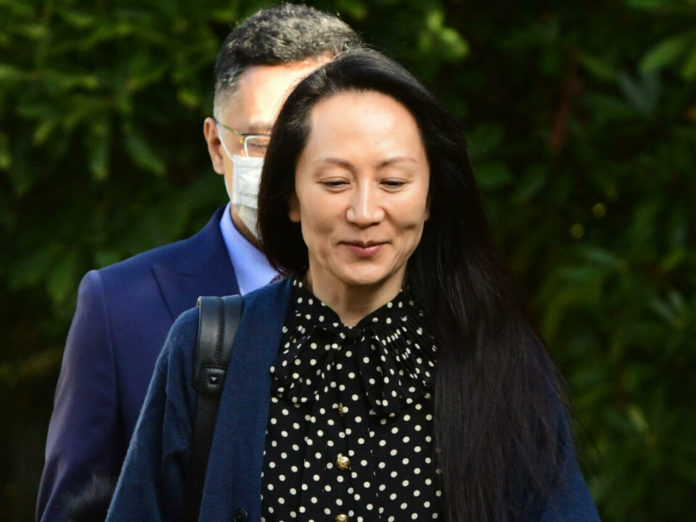BEIJING: Huawei executive Meng Wanzhou was headed home from Vancouver on Saturday as two Canadians were released from prison in China, bringing a close to a bitter diplomatic row that has poisoned ties for three years.
Meng and the two Canadians – former diplomat Michael Kovrig and businessman Michael Spavor – are all on their way back to their home countries after years of being detained in what critics have called “hostage diplomacy”.
Meng, the 49-year-old daughter of Ren Zhengfei, the billionaire founder of Chinese telecoms giant Huawei, was granted release in a Vancouver court hearing after three years of house arrest in Canada while fighting extradition to the United States.
This came hours after US prosecutors announced an agreement under which fraud charges against her are to be suspended and eventually dropped.
She then quickly boarded a flight to the city of Shenzhen, returning to China for the first time since her arrest at Vancouver’s international airport at the behest of US authorities on December 1, 2018.
Meanwhile, Canadian Prime Minister Justin Trudeau announced that the two detained Canadians had left Chinese airspace, and were on their way home.
Their plane was expected to land Saturday in Canada, Trudeau told a news conference in Ottawa, adding that they had gone through “an unbelievably difficult ordeal.”
The “Two Michaels” were detained just days after Meng on what Ottawa has contended were “trumped up” espionage charges. In turn, Beijing called Meng’s case “a purely political incident.”
US Secretary of State Antony Blinken said “the US Government stands with the international community in welcoming the decision” to release the men.
Speaking to reporters before heading to China, Meng said, “Over the past three years, my life has been turned upside down. It was a disruptive time for me as a mother, wife and a company executive.”
She later posted a message on Chinese social media from her plane saying “thank you to the party and government.”
“It is that shade of brilliant Chinese red that…leads me on the long journey home,” she wrote.
Huawei’s ‘princess’
The resolution of the case removes a deep thorn in the relationship between Beijing, Washington and Ottawa, with China accusing the US of a political attack on one of its technology titans.
Beijing also accused Ottawa of doing Washington’s bidding by arresting and holding Meng, known inside Huawei as the “princess” of the company and its possible future leader.
Washington had accused her of fraud against HSBC bank and wire fraud, saying she tried to hide violations of US sanctions on Iran by Huawei affiliate Skycom.
But on Friday, US prosecutors settled for Meng agreeing to a statement of facts in the case.
In exchange, they agreed to defer the charges until 2022, and then drop them if Meng abides by the terms of the agreement.
In China, news of Meng’s agreement to the facts was being scrubbed from the internet.
State news agency Xinhua said she was returning to China “through unremitting efforts of the Chinese government”, while the editor of state-run Global Times said she had been “finally released on a not guilty plea.”
State media did not mention the release of the two Canadians.
US campaign against Huawei
The charges and Meng’s arrest were enmeshed in a broader campaign against Huawei, a private firm that Washington says is closely tied to the Chinese government and People’s Liberation Army.
US officials say Huawei’s phones, routers and switching equipment, used widely around the world, offer Chinese intelligence a potent backdoor into global communications.
Huawei denies that it has any ties to the Chinese military.
Caught in between, Ottawa sought to rally allies, including Washington, to hike pressure on Beijing to release the two Canadians.
Both were put on trial in March this year. In August, Spavor was sentenced to 11 years in prison, while there had been no decision in Kovrig’s case.
“All the while Beijing has insisted that this is not a case of hostage diplomacy — but now they have made it abundantly clear that it is a hostage exchange,” said Lynette Ong, associate professor of political science at the University of Toronto.
“I think it will probably send the wrong lesson to China – that hostage diplomacy works.”
Former Canadian ambassador to China, Guy Saint-Jacques, told AFP that the release of Kovrig and Spavor coinciding with Meng being freed “does confirm that this was hostage diplomacy.”
It also means “one less thorn” in the bilateral relationship, he said – but added Canada-China ties likely “won’t come back to what they were before”.
